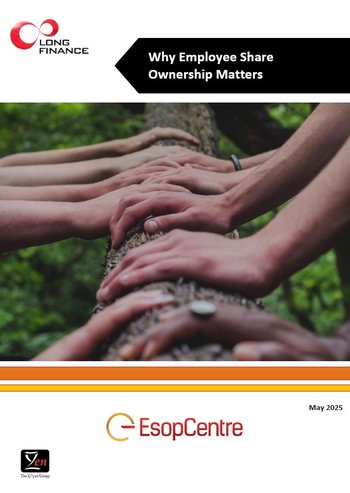Authors
Professor Michael Mainelli, Simon Mills & Robert Pay
Published by
Long Finance & Esop Centre (May 2025), 36 pages.
Share on social media:
You might also be interested in:
Why Employee Share Ownership Matters – 2025 Update
Employees Share Ownership (ESO) contributes to the economy, to social mobility, to levelling up, and to localism. These issues, rather than simply taxation, should also be front and centre in decision-makers’ minds when considering ESO.
ESO began as a USA and UK movement in the 1970s and has since spread widely internationally. This second edition of the 2022 report reaffirms the significance of employee share ownership plans, providing a comprehensive update on the economic, social and policy case for employee share ownership.
Employee Share Ownership Plans (ESOPs) align well with the UN’s Sustainable Development Goals (SDGs), especially SDG 10 – Reduced Inequalities. Although ESOPs are not a panacea, they can help to deliver significant marginal gains across most SDGs, particularly in the development of sustainable, resilient communities. Four areas of public policy can contribute to support the formation and health of ESOPs – education, legislation, taxation, and research (particularly around benchmarking and statistics):
- education - in addition to informing employers and employees about the benefits of employee share schemes, policymakers should ensure that participants are aware of the associated risks, particularly if employees will be relying on accumulated ESOP shares for their retirement
- legislation - ensuring that issues. such as listing requirements and voting rights, do not impede the establishment of ESOPs
- taxation – this paper emphasises that tax advantages are not fundamental to the establishment of ESOPs, however, tax benefits can help start-ups and SMEs who are seeking to enhance the recruitment and retention of key staff while keeping near-term equity-raising and costs under control. Tax benefits can help established firms and their employees within a framework of wider community benefit
- research - benchmarking and statistics are important tools for policy makers seeking to formulate a regulatory and fiscal environment that encourages the formation of ESOPs. A great deal of existing literature exists examines the human resource effects and economic performance of ESOP companies around the world. However, research into the communitarian aspects of ESOPs as well as their impact on the UN SDGs, is less developed.




